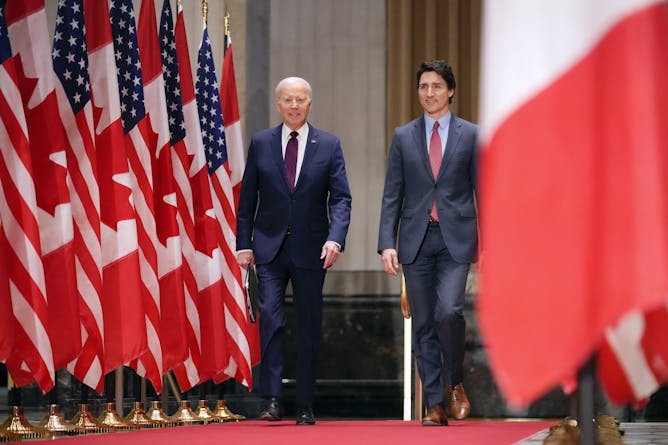|
Canada and the United States have agreed to turn back asylum-seekers at unofficial crossings at the Canada-U.S. border, including Roxham Road in Québec, via an amendment to the Safe Third Country Agreement.
Prime Minister Justin Trudeau and President Joe Biden discussed the change at a news conference on Friday, saying it was necessary to safely resettle asylum-seekers through a new, more organized process that discourages illegal immigration.
But is it the right thing to do?
Today in The Conversation Canada, Laura Madokoro of Carleton University points out that once again, border politics are ignoring the root causes of why people are migrating. She delves into the history of efforts to help and accommodate migrants, including Central American refugees who came to the United States in the 1980s when U.S. foreign policy created political turmoil and conflict in their home countries.
She writes: “It isn’t about the merits of individual claims, or how people decide to seek better lives, or what borders they crossed. It’s about having a better understanding of how and why people all over the world are moving.”
Also today:
All the best,
|

U.S. President Joe Biden and Prime Minister Justin Trudeau arrive for a news conference in Ottawa on March 24, 2023.
(AP Photo/Andrew Harnik)
Laura Madokoro, Carleton University
Canada and the U.S. have effectively decided to crack down on migrants crossing unofficial border points into Canada. Here’s why this approach misses the bigger picture.
|

One in five young adults live in unaffordable housing and spend 30 per cent or more of their pre-tax income on housing costs.
(Shutterstock)
Kate Choi, Western University; Sagi Ramaj, University of Toronto
Young adults are among the groups most adversely affected by the housing crisis. Foreign-born young adults, in particular, are disproportionately more likely to live in unaffordable housing.
|

A driver backs a Volkswagen e-Golf into a parking spot in Peterborough, Ont. Volkswagen has announced plans to build an electric vehicle battery plant in St. Thomas, in southwestern Ontario.
THE CANADIAN PRESS/Doug Ives
Greig Mordue, McMaster University
For the kind of money the federal and Ontario governments probably spent for a Volkswagen EV battery plant in southwestern Ontario, Canada might have been able to launch its own EV maker.
|

The word ‘woke’ has become a politically potent term used to define and discredit a host of social issues.
(Shutterstock)
Dino Sossi, OCAD University
The word ‘woke’ has increasingly become caught up in the rhetoric of the culture war. But debates around wokeness and what it means are drawing attention away from the real issues.
|

There are fewer women in management positions than before the pandemic. There are several reasons for this, but the fact that women prefer to work from home is not helping them rise.
(Shutterstock)
Louise Champoux-Paillé, Concordia University; Anne-Marie Croteau, Concordia University
Far from progressing, the position of women in management in companies is regressing. Several post-pandemic factors are at work, but both men and women are losing out.
|

La représentation négative des clowns dans la culture populaire est un facteur qui semble contribuer beaucoup plus à la coulrophobie.
(Shutterstock)
Sophie Scorey, University of South Wales; James Greville, University of South Wales; Philip Tyson, University of South Wales; Shakiela Davies, University of South Wales
Nos recherches montrent que la coulrophobie, ou peur des clowns, est principalement déclenchée par l’incapacité à comprendre leurs expressions faciales.
|
Arts
|
-
Robert Samuels, University of California, Santa Barbara
Do the show’s fans secretly identify with the characters’ pursuit of power and pleasure?
|
|
Business + Economy
|
-
Danny Bradlow, University of Pretoria
Thirty years ago the World Bank recognised that its position was untenable. It put in place mechanisms to make the bank more accountable to ordinary people.
|
|
Politics
|
-
Jose Caballero, International Institute for Management Development (IMD)
Chinese leadership of a peace deal between Iran and Saudi Arabia, adds to their power in the region.
|
|
Science + Tech
|
-
Zizheng Yu, University of Greenwich
Chinese shoppers find a TikTok-style app is helpful for complaining.
|
|